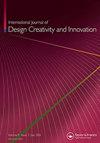Impediments for experimentation in novice design teams
IF 2.5
Q4 ENGINEERING, MANUFACTURING
International Journal of Design Creativity and Innovation
Pub Date : 2018-03-14
DOI:10.1080/21650349.2018.1448723
引用次数: 7
Abstract
Abstract Despite the increasing interest in design thinking, there still is a lack of empirical understanding on what happens when design thinking, or elements of it, are adopted in organizations not accustomed to such approaches. Experimentation is one of the fundamentals of design thinking, and this study explores the impediments for experimentation in four novice design teams taking part in short-term experimentation sprints in a Finnish financial organization. This study adopted a case-study and action research approach and data was gathered through video-recoding and semi-structured interviews. Four central themes that may become bottlenecks when aiming to adopt experimentation in novice teams were identified: resistance to iteration, overlooking the experimentation ideas of others’ and oneself, losing sight of the initial problem to be solved, and a bias towards planning. The study showed that adopting experimentation, in novice design teams requires the team to adopt an appropriate mindset that is open for modifications in the idea and for iteration in the experimentation cycle.新手设计团队实验的障碍
尽管人们对设计思维的兴趣越来越大,但对于在不习惯这种方法的组织中采用设计思维或其元素时会发生什么,仍然缺乏经验上的理解。实验是设计思维的基础之一,本研究探讨了在芬兰一家金融机构参加短期实验冲刺的四个新手设计团队中进行实验的障碍。本研究采用个案研究和行动研究相结合的方法,通过视频编码和半结构化访谈的方式收集数据。当试图在新手团队中采用实验时,确定了四个可能成为瓶颈的中心主题:对迭代的抵制,忽视他人和自己的实验想法,忽略要解决的初始问题,以及对计划的偏见。研究表明,在新手设计团队中采用实验需要团队采用一种适当的心态,对想法中的修改和实验周期中的迭代持开放态度。
本文章由计算机程序翻译,如有差异,请以英文原文为准。
求助全文
约1分钟内获得全文
求助全文
来源期刊

International Journal of Design Creativity and Innovation
ENGINEERING, MANUFACTURING-
CiteScore
3.80
自引率
27.80%
发文量
15
期刊介绍:
The International Journal of Design Creativity and Innovation is an international publication that provides a forum for discussing the nature and potential of creativity and innovation in design from both theoretical and practical perspectives. Design creativity and innovation is truly an interdisciplinary academic research field that will interest and stimulate researchers of engineering design, industrial design, architecture, art, and similar areas. The journal aims to not only promote existing research disciplines but also pioneer a new one that lies in the intermediate area between the domains of systems engineering, information technology, computer science, social science, artificial intelligence, cognitive science, psychology, philosophy, linguistics, and related fields. The journal covers, but is not restricted to, the following topics: ·Theories on Design Creativity and Innovation ·Cognition of Design Creativity ·Innovative Process ·Inventive Process ·Analogical Reasoning for Design Creativity and Innovation ·Design Synthesis ·Method and Tools for Design Creativity and Innovation ·Representation of Design Creativity and Innovation ·Education for Design Creativity and Innovation ·Concept Generation and Inspiration.
 求助内容:
求助内容: 应助结果提醒方式:
应助结果提醒方式:


